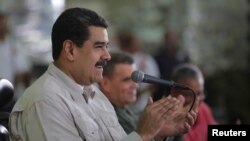Venezuela's cash-strapped government on Tuesday vowed it was making debt payments responsibly, even as two ratings agencies declared partial default on a crippling debt load that has fueled hunger and disease.
President Nicolas Maduro’s government left investors scratching their heads on Monday after a debt negotiation meeting that offered no specifics on plans to avoid default or execute an unlikely restructuring plan.
Despite optimism that payment will continue in the short-term, investors believe the country will at some point be unable to service some $60 billion in junk bonds — potentially triggering messy lawsuits and worsening an already difficult economic situation.
“Today we have initiated payment of interest on Venezuela’s foreign debt,” said Information Minister Jorge Rodriguez in a televised speech, apparently referring to delayed payment of $200 million on several Venezuelan bonds.
Debt renegotiation
Government officials describe Monday’s meeting as the start of a debt renegotiation process that Maduro announced earlier this month.
Venezuela’s Constituent Assembly, an all-powerful legislature created in August despite condemnation by the opposition and the international community, on Tuesday approved a resolution “to support and accompany the refinancing process.”
But investors say that no such process in fact exists. They say Maduro’s government has presented no coherent financial plan, and that any such plan would likely be made impossible by U.S. sanctions.
Bonds downgraded
Ratings agency Fitch on Tuesday downgraded Venezuelan bonds to “selective default,” citing delays in paying interest on bonds maturing in 2019 and 2024. The decision followed a similar one by S&P on Monday and by Fitch on debt from state oil company PDVSA.
“Selective default” means that a ratings agency believe that a borrower has defaulted on some of its obligations but will likely continue to make timely payments on others.
In response, Venezuela and PDVSA bonds tumbled on Tuesday, wiping out most of a rally from last week that had been driven by investor confidence that payment would continue.
In a sign it may be gearing up for a legal dispute, Venezuela has appointed lawyer David Syed to advise it, working alongside a team at global law firm Dentons, according to IFR, a Thomson Reuters news service.
Routine delays
Investors nonetheless appear to remain broadly comfortable with a wait-and-see approach, with no clear signs of creditors preparing to file legal claims in response to payment delays.
That approach is encouraged by the staggering investment return on Venezuelan bonds, which Tuesday were paying an average of 50 percentage points more than comparable U.S. securities.
Delays have become routine since October, when Venezuela and PDVSA starting using 30-day grace periods to stretch out limited cash-flow. Investors broadly shrug them off, and some take advantage of associated market jitters to buy them on the cheap.
U.S. citizens blocked
Sanctions by the government of U.S. President Donald Trump, in response to accusations that Maduro’s government has undermined democracy and systematically violated human rights, block U.S. citizens from buying newly issued Venezuelan debt.
That makes it effectively impossible for the country to refinance, because such operations rely on swaps in which investors exchange outstanding bonds for new ones.
The measures also bar any dealings with dozens of blacklisted officials, including Vice President Tareck El Aissami and Economy Minister Simon Zerpa — the two main leaders of the debt negotiation commission.
Venezuela has dismissed U.S. accusations of drug-dealing and corruption by its officials as politically motivated fabrications by Washington to tarnish the country's reputation, and describes the sanctions as a colonial exercise by the Trump government.
Venezuelans hit hard
Four years of recession in the South American nation, fueled by failing socialist economics and a plunge in global oil prices, have hit Venezuelans hard. Many skip meals or suffer from malnutrition and preventable diseases.
With some $9 billion in payments looming for 2018, a default would be a short-term relief for the government, enabling Maduro to spend on desperately-needed food and medicine imports ahead of next year’s presidential election.
But that strategy could also backfire if it sparks aggressive legal challenges from abroad, including moves to seize assets of PDVSA.





